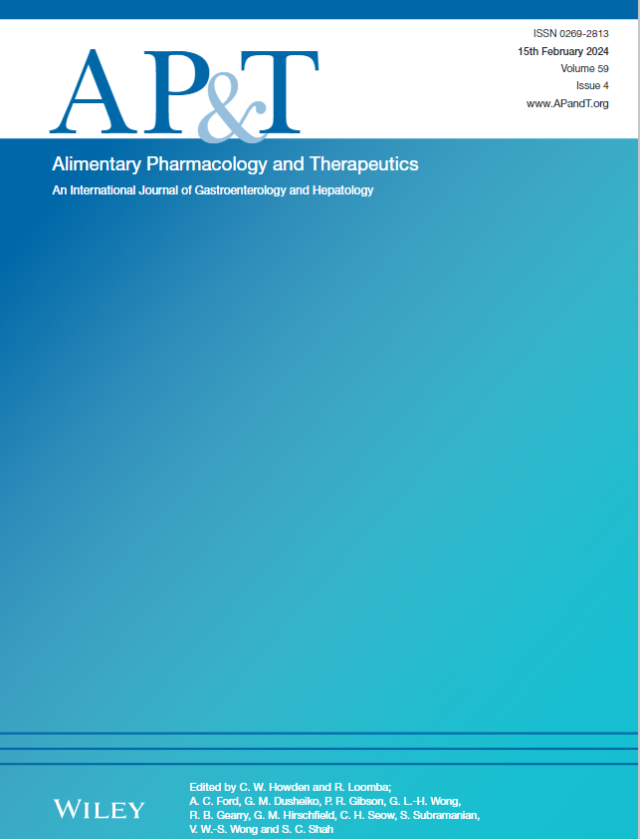Persistent Binge Drinking History Associated With Advanced Liver Fibrosis and All‐Cause Mortality in MetALD
IF 6.6
1区 医学
Q1 GASTROENTEROLOGY & HEPATOLOGY
引用次数: 0
Abstract
BackgroundMetabolic dysfunction and alcohol‐related liver disease (MetALD) is characterised by the coexistence of metabolic dysfunction and moderate alcohol intake. In this population, the impact of specific drinking patterns and history, particularly persistent binge drinking (PBD) history, on disease severity and prognosis remains unclear.AimTo evaluate the association between a history of PBD and the risks of advanced fibrosis and all‐cause mortality in individuals with MetALD.MethodsWe analysed data from NHANES 1999–2016, including adults with MetALD. PBD is defined as having had a history of drinking ≥ 4 (women) or 5 (men) alcoholic beverages almost every day, based on ALQ150/151 questionnaires. Advanced fibrosis was defined as FIB‐4 > 2.67, and mortality outcomes were obtained from the National Death Index. Multivariable logistic and Cox regression models were used to examine the associations between PBD and both liver fibrosis and all‐cause mortality, adjusting for alcohol intake and other confounders.ResultsAmong 865 individuals with MetALD, 326 (37.7%) reported a history of PBD. Compared to those without PBD, participants with PBD had a higher risk of advanced fibrosis (adjusted OR = 2.23, 95% CI: 1.12–4.45,持续酗酒史与晚期肝纤维化和全因死亡率相关
代谢功能障碍和酒精相关性肝病(MetALD)的特点是代谢功能障碍和适度饮酒并存。在这一人群中,特定的饮酒模式和历史,特别是持续酗酒史(PBD)对疾病严重程度和预后的影响尚不清楚。目的评估PBD病史与MetALD患者晚期纤维化风险和全因死亡率之间的关系。方法我们分析1999-2016年NHANES的数据,包括患有MetALD的成年人。根据ALQ150/151问卷,PBD被定义为几乎每天饮用≥4(女性)或5(男性)酒精饮料的历史。晚期纤维化定义为FIB‐4 >;2.67,死亡率结果来源于国家死亡指数。采用多变量logistic和Cox回归模型检验PBD与肝纤维化和全因死亡率之间的关系,调整酒精摄入和其他混杂因素。结果865例MetALD患者中,326例(37.7%)有PBD病史。与没有PBD的患者相比,PBD患者发生晚期纤维化的风险更高(调整后OR = 2.23, 95% CI: 1.12-4.45, p = 0.023)。PBD还与全因死亡率增加相关(调整后HR = 1.48, 95% CI: 1.03-2.13, p = 0.035)。PBD患者过夜住院的高风险支持了这些发现(调整后OR = 1.88, 95% CI: 1.15-3.06, p = 0.012)。结论pbd病史与MetALD晚期纤维化和死亡率增加相关。临床评估应包括对饮酒模式和历史的评估,特别是持续酗酒。
本文章由计算机程序翻译,如有差异,请以英文原文为准。
求助全文
约1分钟内获得全文
求助全文
来源期刊
CiteScore
15.60
自引率
7.90%
发文量
527
审稿时长
3-6 weeks
期刊介绍:
Alimentary Pharmacology & Therapeutics is a global pharmacology journal focused on the impact of drugs on the human gastrointestinal and hepato-biliary systems. It covers a diverse range of topics, often with immediate clinical relevance to its readership.

 求助内容:
求助内容: 应助结果提醒方式:
应助结果提醒方式:


